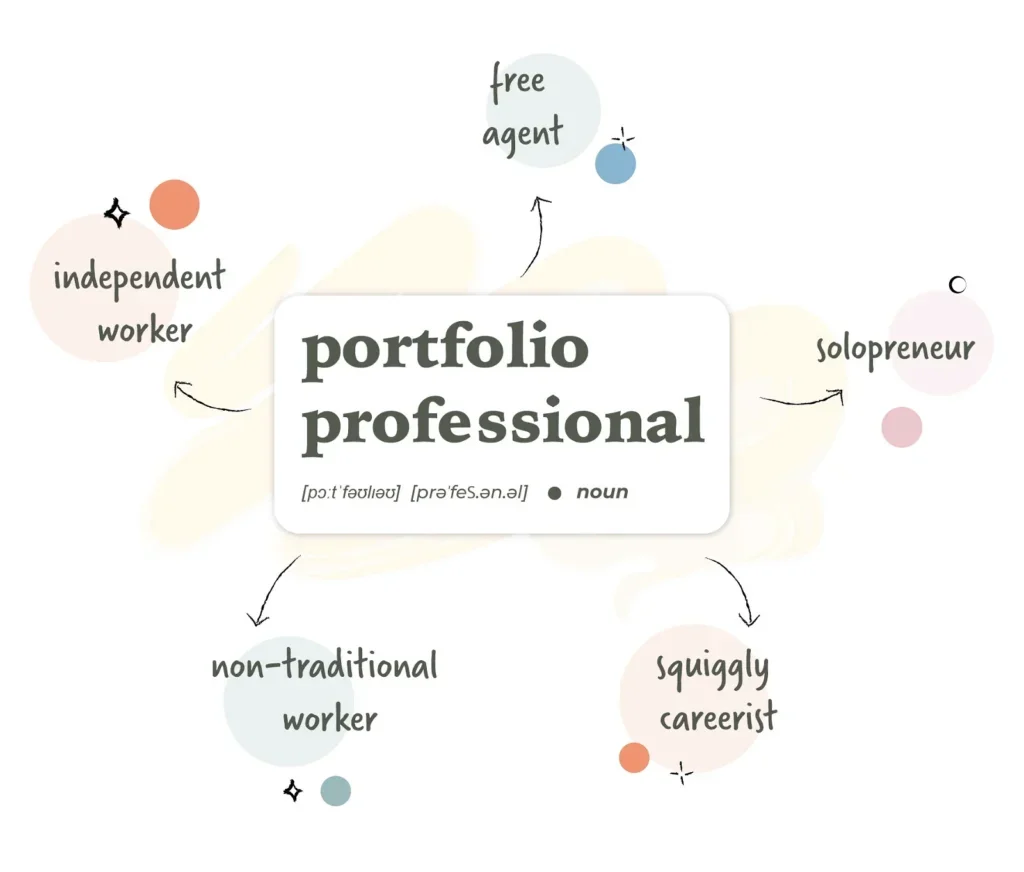TPC Team
We’ve been preaching the gospel of portfolio careers for nearly four years now – longer, in fact, if you count the time we spent building and explaining our own multifaceted careers before The Portfolio Collective came into existence.
That’s because fractional work is here to stay. It’s not becoming the norm; we’re already there, with 47% of the global workforce identifying as self-employed and a gig economy that accounts for 12% of the international labour market.
What’s more is that those numbers are only expected to grow over the coming years, with 52% of workers having professional ambitions that aren’t tied to any one particular company.
47%
of the global workforce identifies as self-employed
52%
of professional have ambitions that aren’t tied to any one particular company
So what about portfolio careers here and now?
There’s been a lot of research around the future of careers and how fractional work is expected to change the professional landscape – but what do we know about the people who currently have portfolio careers?
A few months ago, we decided to find out for ourselves and launched a survey that dug deeper into the motivations, anxieties and earning potential of portfolio professionals.
And whilst that survey is still collecting valuable data, we wanted to share a quick teaser of some of the insights we’ve collected so far.
To date, we’ve had over 230 responses, 69% of which are currently working as portfolio professionals and 31% have plans to start a portfolio career in the near future.
Here’s what we discovered.
There’s no one definition of what a portfolio career looks like
Even the term ‘portfolio professional’ isn’t as widely recognised as we’d like (though it’s grown in popularity over the last few years!) – some call it a squiggly career, others call it independent or fractional work. Every portfolio career is different, but the common thread connecting it all is a desire to be in control of your life and to make money in several different ways.


When asked how they describe their portfolio career, 31% of our respondents identified as freelancers, 21% as multi-hyphenates (meaning they did lots of diverse things), 18% as focused experts and 9% as side hustlers.
The remaining 21% described themselves as anything from entrepreneurs and business-builders to investors and mentors. Others were in the process of moving from one career type to another.
31% Freelancers
21% Multi-hyphenates
18% Focused experts
9% Side hustlers
21% Describe their career differently*
*Some described themselves as entrepreneurs, business-builders, investors and the like. Others had multiple types or were currently moving from one type to another.
Portfolio career type snapshot
When we broke those types down, there were some interesting trends around pay and motivation.
Freelancers
Average rates:
>$400 a day
Main motivation:
Being in charge of who they work with
Most confident about:
Building a personal brand
51% Female / 49% Male
Multi-hyphenates
Average rates:
>$400 a day
Main motivation:
Wants to pursue diverse interests
Most confident about:
Articulating their USP
34% Female / 66% Male
Focused experts
Average rates:
>$800 a day
Main motivation:
Being in charge of who they work with
Most confident about:
Articulating their USP
36% Female / 60% Male / 4% Prefer not to say
Side hustlers
Average rates:
<$300 a day
Main motivation:
Wants to pursue diverse interests
Most confident about:
Keeping their careers organised
29% Female / 64% Male / 7% Prefer not to say
How portfolio professionals find work
Finding fractional roles requires a lot of personal outreach and an innate ability to foster positive relationships with both clients and colleagues – in other words, the jobs aren’t always on the big-name job boards.
These are the ways our respondents found work most often:


38%
through referrals


26%
through their network


13%
through LinkedIn


6%
through job boards


5%
through The Portfolio Collective


4%
through recruitment agencies


8%
through other channels*
*Professional events, cold outreach, partnerships, marketing and other social media channels.
A majority found projects through referrals or their network, with the least amount saying they used more traditional routes like recruitment agencies. And those earning over $400 a day find that significantly more work came to them from their network reaching out to them directly.
How does pay influence career anxieties?
Interestingly, those who charged the highest day rates were the most worried about loneliness and those who charged the lowest day rates worried the most about imposter syndrome.
Almost everyone, across the board, was anxious about generating consistent income 12 months of each year.
Most common anxieties by pay rate
Loneliness
Imposter syndrome
Self-motivation & productivity
Getting their foot in the door
Generating consistent revenue
Other
Do portfolio careers suffer the same gender disparities as traditional work?
Yes and no. Men are still more confident about charging higher rates, but there’s more opportunity for women to carve their own paths as portfolio professionals.
Day rates by gender
Female
Male
What’s more is that we found women struggle less with imposter syndrome than men as they move into higher pay brackets (with 56% of low earners struggling with it compared to only 25% of high earners).
Want to learn more about portfolio careers? So do we!
There’s still so much for us to understand about this sect of the professional workforce. So help us by completing our survey and getting others to do the same. We want to hear from current portfolio professionals and people who are interested in pursuing a different way of working.
Together, we can build the largest survey on portfolio careers to date – join us on that journey.


Portfolio career survey
A comprehensive deep dive into portfolio professionals and everything that fuels their success – including The Portfolio Collective community.
Think this sounds like the right path for you? Come along to our monthly Get started event for new members to find out what a portfolio career could look like and how The Portfolio Collective can help you take those first steps towards professional success – and don’t forget to connect with our community!



